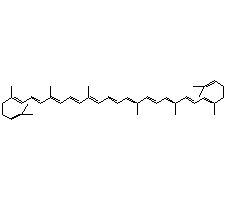Tomato plant extract
Inquiry
| Post Date: | May 17,2025 |
| Expiry Date: | Nov 13,2025 |
| Detailed Description: |
Cas No. :502-65-8
Tomato P.E., 5~98% Lycopene CAS#: 502-65-8
Main Contents: Lycopene Plant Resource: Lycopersicon esculentum Mill. Product Specification: 5,6,10,20,60,98%HPLC Appearance: Reddish Brown Powder Plant Part Used: Fruit Extract Solution: Petroleum ether Molecular formula and weight: C40H56, 536.873 Measurement system: HPLC adopted with ultrasonic assisting, dissolving by chromatogram class petroleum ether. For further information, please contact with lab@3wbio.com. What is Tomato Extract? Lycopene, effective ingredient of tomato extract, is a bright red carotene and carotenoid pigment and phytochemical found in tomatoes and other red fruits & vegetables, such as red carrots, watermelons and papayas (but not strawberries or cherries). Although lycopene is chemically a carotene, it has no vitamin A activity. In plants, algae, and other photosynthetic organisms, lycopene is an important intermediate in the biosynthesis of many carotenoids, including beta carotene, responsible for yellow, orange or red pigmentation, photosynthesis, and photo-protection. Structurally, it is a tetraterpene assembled from eight isoprene units, composed entirely of carbon and hydrogen, and is insoluble in water. Lycopene's eleven conjugated double bonds give it its deep red color and are responsible for its antioxidant activity. Due to its strong color and non-toxicity, lycopene is a useful food coloring. Lycopene is not an essential nutrient for humans, but is commonly found in the diet, mainly from dishes prepared with tomato sauce. When absorbed from the stomach, lycopene is transported in the blood by various lipoproteins and accumulates in the liver, adrenal glands, and testes. Because preliminary research has shown an inverse correlation between consumption of tomatoes and cancer risk, lycopene has been considered a potential agent for prevention of some types of cancers, particularly prostate cancer. However, this area of research and the relationship with prostate cancer have been deemed insufficient of evidence for health claim approval by the US Food and Drug Administration Where will be Tomato Extract used to? • Antioxidant • Increasing immunity • Prevent cancer, anti-cancer • Alcohol cravings • Prevent prostatitis Packing Detail: Packed in paper-drums and two plastic-bags inside. Barrels outside printed name, gross weight, batch number, production units, production time, effective time, storage and transportation methods. Net Weight: 25kgs/drum. Storage Situation: Stored in a well-closed container away from moisture and light. Shelf Life:Two years under well Storage situation and stored away from direct sun light. |
| CAS Registry Number: | 502-65-8 |
| Synonyms: | ;C.I. 75125;CI 75125;Lycopene Beadlet;LYCOSOURCE;LYCOPENE;JARCOPENE(TM);4,4-CAROTENE;2,6,10,14,19,23,27,31-OCTAMETHYL-DOTRIACONTA-2,6,8,10,12,14,16,18,20,22,24,26,30-TRIDECAENE;PSI,PSI-CAROTENE;Y,Y-CAROTENE;E 160d;(5cis,5'cis,9cis,13cis)-psi,psi-carotene; |
| Molecular Formula: | C40H56 |
| Molecular Weight: | 536.8726 |
| Molecular Structure: | 
|
| Company: | 3W Botanical Extract Inc. [ China ] |
| Contact: | Harrison Chang |
| Tel: | 86-731-82938995 |
| Fax: | 86-731-82938822 |
| Email: | Sales@3wbio.com |
-
Disclaimer statement:The information and data included above have been realized by the enterprises and compiled by the staff, and are subject to change without notice to you. The Chemnet makes no warranties or representations whatsoever regarding the facticity, accuracy and validity of such information and data. In order to ensure your interest, we suggest you chose the products posted by our gold suppliers or VIP members.

-
- Loquat leaf Extract Produc...
- High Quality Ginkgo Extrac...
- Mangosteen Extract Produce...
- Water Soluble Gingerol Pro...
- Garlic Extract Producer
- Huperzia Serrata Extract P...
- Mulberry Leaf Extract Prod...
- Bayberry Bark Extract Prod...
- High Quality Kava Extract
- Horse Chestnut Extract Pro...
- Gymnema Extract Producer
- Green Coffee Bean Extract ...
- Gotu Kola Extract Producer
- Milk Thistle Extract Produ...
- Ginkgo Extract Producer
- Ginger Extract Producer
- High Quality Theaflavin
- High Quality Gynostemma Ex...
- High Quality Ivy leaf Extr...
- High Quality Coenzyme Q10
- High Quality Acetyl-trans-...
- High Quality Garcinia Camb...
- High Quality Astaxanthin
- High Quality Guarana Extra...
- High Quality Saffron Extra...

